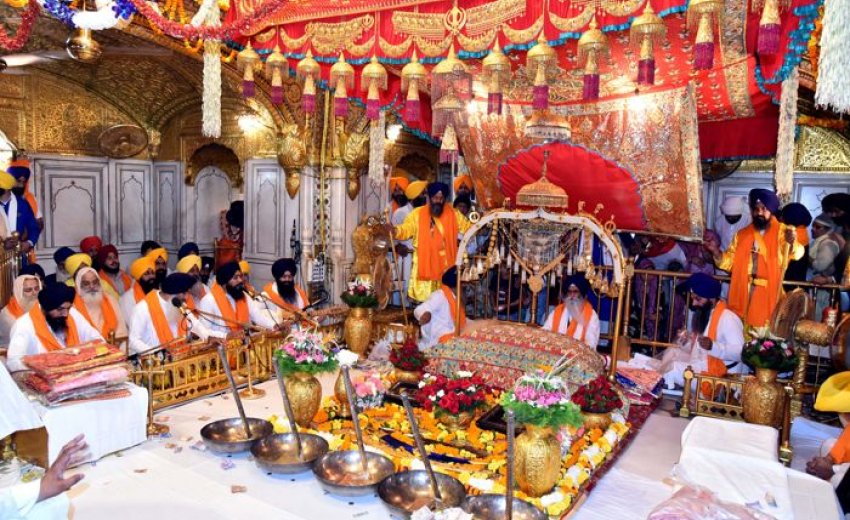The Gurdwara Sikh temple in Phuket Town is a vibrant hub where the Sikh community gathers to worship and connect. Beyond the familiar rituals of traditional Indian Sikh services, the atmosphere resonates with a unique blend of cultural identity and spiritual devotion. Despite the structured schedule of the main prayer service on Sundays, worshippers flow in and out at their own pace, creating a dynamic space where social interaction intertwines with religious observance. For outsiders, the rituals and customs may appear unfamiliar, even peculiar, highlighting the diversity of religious expression within our global community.
At Home In The Temple
In a Sikh service, moments of music and chanting by Ragis, musicians, punctuate readings from the Guru Granth Sahib, the Sikh holy book, performed by the Granthi, the scripture reader. The congregation is seated separately by gender, with women on the left and men on the right. In the center, a woman collects donations while facing a vibrant platform where a man waves the "Chaur Sahib," a fan symbolizing reverence for the scripture.
In Sikh communities, there's a spectrum of adherence to religious practices. Many younger Indians tend to follow Sikhism moderately, although there are exceptions, with some individuals embracing the faith more strictly.
Sikhs who publicly commit to their faith through the Amrit Ceremony are known as members of the Khalsa, a community of baptized Sikhs. They adopt five symbols known as the Five K's, which serve to signify Sikh identity and hold profound spiritual significance. These symbols include Keshas (unshorn hair), Kangha (a comb), Kara (a steel bracelet), Kachha (pair of shorts), and Kirpan (a sword), which every Sikh is encouraged to carry at all times.
An attendee reclines while sipping his sweet, hot tea and smiles, “Sikhs are also supposed to pray three times a day, the first of which is at 4am, but we are Phuket people so people typically pray whenever they wake. In our family, it’s whoever gets up first: usually at about 7 or 8 am.
“And although one of the main tenants of Sikhism is to refrain from alcohol and other intoxicants, some Phuket Sikh men do sometimes indulge in a social drink.”
Sikh-ing An Identity
In Phuket, many Sikhs are known for their work in tailoring. They also thrive in various other professions such as hospitality, real estate, and jewelry sales, like Sharan Singhsachabula, a friendly young Sikh who runs a shop in Patong. Sharan's family history traces back to his grandparents who arrived in Phuket in 1947 to work in the tin mines after a stint in Chiang Mai, a tale reminiscent of many Indian families' experiences during that era.
“They came for a better life. After India gained independence in 1947, a lot of Indians left looking for a better life.”
Shifting Trends Among Phuket's Sikh Youth
Following India's independence, the division of 'British India' led to the emergence of Indian and Pakistani territories. Since then, tensions between the two nations have been fueled by political and historical disputes. Addressing whether similar animosity exists in Phuket among Indian and Pakistani communities as seen in other countries, Sharan comments, “When our people left either before or at that time it was all India, so we are all Indian.”
“Anyway that is politics of the land and not the people. Furthermore we are Thai.”
“We have a Thai mentality, but when we are here they see us as Indian, and when we go to India they know almost straight away that we are not Indian. We have no real home,”
Sharan remarks with a wry smile.
However, his sarcasm belies a deeper truth: within the walls of the Gurdwara, the over fifty attendees sharing meals, conversations, and laughter, find a sense of belonging and familial connection. The Gurdwara transcends its religious significance to become the focal point of the community, a true home.
Maintaining Sikh traditions in Phuket's small community is challenging. Marrying within the faith is preferred, but with only 40 Sikh families on the island, finding suitable partners can be tough. Sharan, married for years, met his wife through social connections, even on Facebook. Today's Sikh children attend local international schools, unlike Sharan, who studied in India. Despite cultural shifts, challenges persist, worsened by post-9/11 misconceptions. Sara, a third-generation Sikh, switched to Buddhism after the 2004 tsunami. Despite religious differences, harmony prevails within her family, showcasing the power of tolerance and understanding to unite despite diverse beliefs.
*Based on an article by Jody Houton, published in The Phuket News on 13th June 2012
